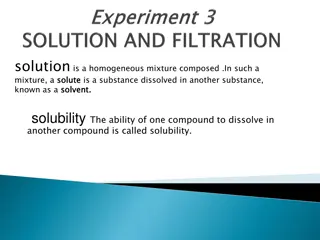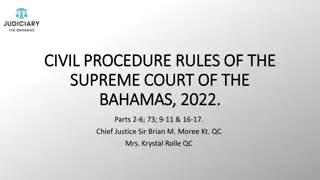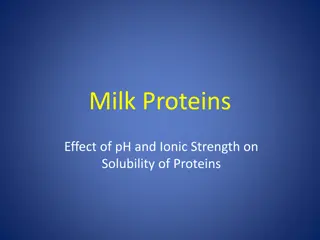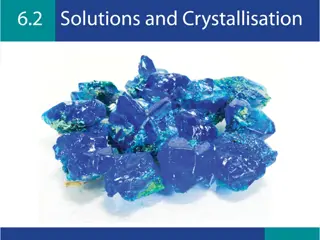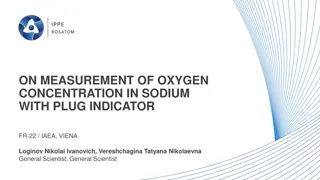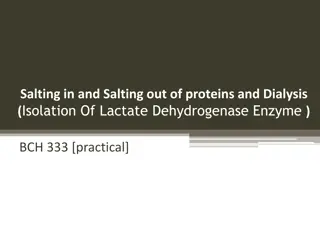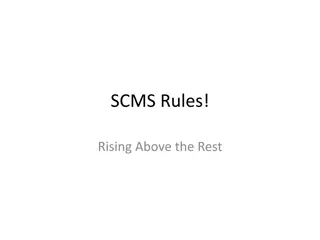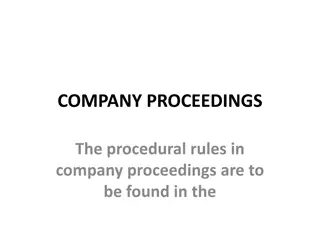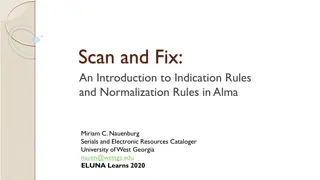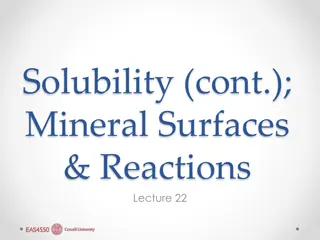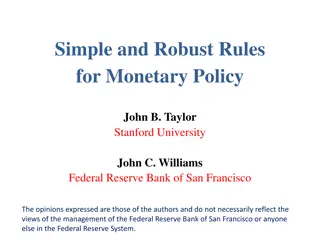Understanding Solutions and Precipitation Reactions
Solutions are classified as saturated, unsaturated, or supersaturated based on the concentration of solute in the solvent. Solubility plays a critical role in determining the amount of solute that can be dissolved in a solvent at a given temperature. Reactions yielding products of limited solubility
6 views • 10 slides
Understanding Civil Procedure Rules Parts 18-23
The new civil procedure rules cover various aspects such as counterclaims, additional claims, changes to parties, representative parties, miscellaneous rules, and rules regarding minors and patients. The overriding objective is to ensure cases are dealt with justly and at a proportionate cost, consi
1 views • 49 slides
Motorboat Training, testing, and licensing: Rules of the Road & Aids to Navigation Manual
This presentation covers essential information on motorboat training, testing, and licensing, focusing on rules of the road and aids to navigation. It includes details on navigation rules, the importance of following them to prevent accidents, and where the rules apply. The content also explains who
0 views • 34 slides
Understanding Solubility of Organic Compounds
A solution is a homogeneous mixture composed of a solute dissolved in a solvent. Solubility refers to the ability of one compound to dissolve in another. The solubility of organic compounds can be categorized based on chemical reactions like acid-base interactions. Different methods such as gravity
0 views • 6 slides
Mechanism of General Anaesthesia Theories: Lipid Solubility, Surface Tension, Microcrystal, Protein Binding
Mechanism of general anaesthesia involves theories focusing on the interaction of anaesthetics with cell membrane components like lipids and proteins. The Lipid Solubility theory emphasizes the importance of an anaesthetic's affinity and solubility in nerve cell membranes, while the Surface Tension
1 views • 10 slides
Understanding the New Civil Procedure Rules Parts 18-23
The new civil procedure rules cover various aspects like counterclaims, addition of parties, changes to case statements, representative parties, miscellaneous rules about parties, and rules regarding minors and patients. The overriding objective is to ensure cases are dealt with justly and at a prop
3 views • 49 slides
Understanding Physicochemical Properties of Drugs
The physicochemical properties of drugs play a crucial role in their pharmacological effects. These properties include physical and chemical characteristics that influence interactions with biomolecules. Solubility, partition coefficient, and dissociation constant are key factors affecting drug beha
1 views • 46 slides
Civil Procedure Rules of the Supreme Court of The Bahamas, 2022
The Civil Procedure Rules of the Supreme Court of The Bahamas, 2022 detail the application of CPR to civil proceedings, highlighting exceptions, the Woolf Reforms, and key provisions such as active case management and the overriding objective. The rules also address proceedings commenced before the
2 views • 30 slides
Free Science Education Resources on Science Prof Online (SPO)
Science Prof Online (SPO) is a valuable free science education website offering fully-developed Virtual Science Classrooms, science-related PowerPoints, articles, and images. It serves as a comprehensive resource for students, educators, and anyone interested in science. Explore practice test questi
0 views • 17 slides
Solubility Rules from the University of South Carolina
This resource outlines the solubility rules for various compounds based on their chemical properties. It explains the solubility of compounds of alkali metals, ammonium salts, nitrates, chlorides, sulfates, and more. The rules provide insights into which compounds are soluble or insoluble in aqueous
1 views • 10 slides
Experimenting with Supersaturated Solutions: Rock Candy Creation
Exploring the phenomenon of supersaturated solutions through an experiment creating rock candy. The solubility of sucrose in water is observed at different temperatures, showcasing how more sugar can dissolve in a hot solution than in a cold one. The process of supersaturation and crystallization is
0 views • 11 slides
Pharmaceutical Dosage Form Design and Drug Delivery Systems Overview
Understanding pH-solubility profiles of drugs like indomethacin, chlorpromazine, and oxytetracycline is crucial in formulating pharmaceuticals. Factors affecting dissolution rates, such as particle size and solubility, can be optimized to enhance drug absorption. Different methods like particle size
0 views • 46 slides
Financial and Eligibility Rules for EU Cooperation Programmes
Financial and eligibility rules for EU cooperation programmes include details on the first-level control unit, sources of information, hierarchy of rules, overarching eligibility rules, and reporting overview. These rules cover areas such as project activities, expenditure eligibility, procurement r
2 views • 27 slides
Rural Access Compliance Rules Proposal by Glenn Disher - PBM Investigator
Proposal by Glenn Disher, a PBM Compliance Investigator, outlines rules for rural access compliance. The proposal focuses on considering local conditions and enforcing rules for maximum impact. It includes recommendations for zip code rules, compliance mileage rules, and examples of non-compliant ru
0 views • 7 slides
Understanding Protein Solubility: Effects of pH, Ionic Strength, and Salting Out
Exploring the factors influencing the solubility of proteins, including pH levels, ionic strength, and salting out techniques. This study delves into the isoelectric point of proteins and the impact of salt addition on solubility, aiming to enhance comprehension in the field of protein biochemistry
0 views • 14 slides
Understanding Solutions and Solubility in Chemistry
Explore the concepts of solutions, solvents, solutes, and solubility in chemistry through investigations with various substances and solvents. Learn how to differentiate between dilute, concentrated, and saturated solutions, measure solubility, create solubility curves, and understand crystallizatio
0 views • 36 slides
Understanding Solubility: Applications and Experiments
Solubility plays a crucial role in various applications such as cleaning, separation, and identification. This content explores how solubility works with practical examples using magnets and marbles to illustrate the concept. Discover the differences between polar and non-polar compounds through han
0 views • 40 slides
Guide to Recrystallization Techniques for Purifying Solid Organic Compounds
Solid organic compounds obtained from organic reactions are often impure and require purification through recrystallization. This process involves choosing a suitable solvent, testing solubility, and using decolorizing charcoal to remove impurities. Proper solvent selection is crucial for successful
0 views • 13 slides
Understanding Company Attribution Rules in Legal Proceedings
Company attribution rules in legal proceedings are outlined, focusing on primary rules found in a company's constitution, general principles of agency, and exceptions where traditional attribution methods may not apply. The interpretation of laws involving companies and the application of specific a
0 views • 7 slides
Measurement of Oxygen Concentration in Sodium with Plug Indicator FR-22
Determining oxygen concentration in sodium using plug indicators is crucial for experimental facilities and nuclear reactors. This involves lowering sodium temperature slowly until sodium oxide crystallization begins, indicating saturation temperature (TS). Several solubility equations exist for cal
0 views • 6 slides
Understanding Solubility, Polarity, and Cleaning in Chemistry
Explore the concepts of solubility in different solvents, the role of polarity in dissolving compounds, and how cleaning agents work based on their polar or nonpolar nature. Discover how soap molecules form micelles to remove stains effectively, and learn about emulsions like mayonnaise where oil an
0 views • 18 slides
Protein Isolation Techniques: Salting In and Salting Out
Proteins exhibit varying solubility based on salt concentrations, with salting in increasing solubility and salting out causing precipitation. This practical involves isolating lactate dehydrogenase enzyme using salting in, salting out, and dialysis techniques, as well as assessing purity through ac
0 views • 19 slides
Understanding Mixtures: Solutions, Colloidal Dispersions, and Suspensions
Food mixtures can be classified based on particle size distribution, with the dispersed phase scattered throughout a continuous medium. Solutions, a type of mixture, consist of a solute (dispersed phase) and a solvent (continuous phase), forming a homogenous blend. Factors like temperature, particle
0 views • 80 slides
Understanding Substances, Mixtures, and Solubility in Physical Science
Explore the concepts of substances, mixtures, and solubility in Physical Science with a detailed explanation of solutions, types of mixtures, and the importance of understanding these in everyday life. Discover the differences between atoms, elements, pure substances, and mixtures, and learn about h
0 views • 81 slides
Layout and Electrical Rules Check by KANTHARAJU P.K.
Layout rules check is essential in preparing masks for fabrication processes to ensure accuracy. Key design rules include minimum width, spacing, enclosure, and extension. Electrical rules checking (ERC) methodology is used to verify design robustness against electronic design rules at schematic and
0 views • 15 slides
School Rules and Expectations at SCMS
This content outlines the rules, expectations, and procedures for students at SCMS, emphasizing responsibility, accountability, and respect. It covers district-wide rules, brave expectations aligned with those rules, common procedures for all students, and specific guidelines for morning routines. T
0 views • 23 slides
Understanding Time and Value of Supply in VAT Webinar Series
This course note covers the essential aspects of time and value of supply in relation to VAT rules. It explains key rules that determine when VAT must be accounted for and paid, focusing on important regulations impacting vendors. Topics include general time of supply rules, rules for connected pers
0 views • 44 slides
Understanding Procedural Rules in Company Proceedings
Procedural rules governing company proceedings can be found in the Companies Proceeding Rules, Companies Winding-Up Rules, and the Federal High Court (Civil Procedure) Rules. These rules dictate the process for applications, such as Originating Summons, Originating Motion, or Petition under CAMA. Th
0 views • 22 slides
Understanding Ocular Pharmacology: General Principles and Drug Delivery
The study of ocular pharmacology involves understanding general pharmacological principles, pharmacodynamics, and pharmacokinetics. Drugs can be delivered to ocular tissue locally via eye drops, ointments, injections, or systemically through oral or intravenous routes. Factors such as drug concentra
0 views • 58 slides
Scan and Fix: Indication and Normalization Rules in Alma
Introduction to indication rules and normalization rules in Alma Miriam C. Nauenburg's presentation on the scan and fix workflow. Learn about creating and applying indication and normalization rules, testing rules in the Metadata Editor, and organizing rules as private or shared.
0 views • 54 slides
Understanding Concentration and Solubility in Solutions
This content covers topics related to concentration and solubility in solutions, including calculating concentration, determining solubility, and comparing different solution properties based on concentration levels. It also includes examples and explanations to help understand these concepts better
0 views • 6 slides
Understanding Precipitation Reactions in Analytical Chemistry
Precipitation reactions play a crucial role in analytical chemistry, where cations and anions combine to form insoluble solids called precipitates. By following solubility rules, scientists can predict these reactions, aiding in identifying ions present in solutions. Properties, formation, and equil
0 views • 17 slides
Recent Advances in FEVE Fluoropolymer Resin Technology
Recent discoveries in FEVE technology showcase the impressive properties of Fluoroethylene Vinyl Ether (FEVE) resins, such as weatherability, chemical resistance, gloss, solubility, and crosslinking. These resins offer ambient cure for field applications, OH functionality for crosslinking, solvent s
0 views • 25 slides
Understanding Solubility and Mineral Reactions in Geology
Exploring the complexities of solubility in minerals such as silica, hydroxides, and ferric iron, this informative lecture delves into stability diagrams and the impact of pH on mineral dissolution. Various reactions, equilibrium expressions, and the role of hydroxides in controlling metal solubilit
0 views • 18 slides
Understanding Solubility Product Constant for Slightly Soluble Salts
Solubility product constant (Ksp) is a special constant that describes the solubility of slightly soluble salts like potassium acid tartrate (KHT) and silver chloride (AgCl) in solution. This experiment aims to determine Ksp for KHT and explore factors affecting Ksp such as temperature and common io
0 views • 13 slides
Simple and Robust Rules for Monetary Policy Overview
This document discusses the historical background, empirical experience, characteristics of simple rules, robustness, and the comparison between optimal control and simple rules in monetary policy. It explores the evolution of policy rules from Smith and Ricardo to modern approaches, emphasizing the
0 views • 22 slides
Capacity Allocation Mechanisms (CAM) Business Rules Workshop Summary
This summary provides insights into the Capacity Allocation Mechanisms (CAM) Business Rules Workshop held at Ashling Hotel, Dublin on July 2, 2014. The workshop covered topics such as CAM business rules scope, key features, auction processes, code modifications, implementation timelines, and consult
0 views • 32 slides
Chemical Reactions: Writing, Balancing, and Mastering Skills
Explore the essential topics of balancing chemical reactions, determining reaction occurrence, memorization tips, and using solubility tables. Master the art of writing and balancing reactions through fundamental rules, techniques, and practice examples. Understand the basics of chemical reactions,
0 views • 20 slides
Understanding Solutions and Solubility through Experiments
Explore the concept of solutions and solubility through various investigations and experiments. Learn about solvents, solutes, and solutions, and discover how temperature affects solubility. Use the particle model to explain the process of dissolving and understand the properties of saturated soluti
0 views • 10 slides
Chemistry Study Materials and Practice Questions
This collection of chemistry study materials includes information on reactions, solubility, electrolytes, and solution stoichiometry. Practice questions cover classifying solutes, predicting solubility of salts, writing ions produced in water, and determining precipitates in reactions. Includes a mo
0 views • 15 slides



